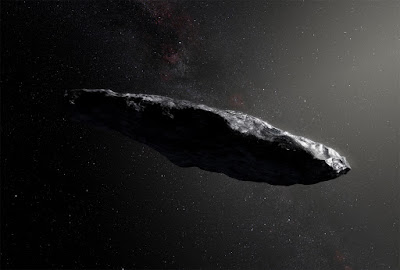The first detected interstellar object passed through the inner Solar-System last year, and is now heading away back to interstellar space. Named 'Oumuamua', the object, approximately 230 metres in length and around 30 metres wide, reached a speed of almost 88 kilometres per second at its closest approach to the sun.
There's a reasonable possibility that the object is artificial. It could be an interstellar colonisation mission that is using our sun to provide a gravitational course correction, putting it on its final trajectory for its target star system, or setting itself up for another gravitational course correction in tens of thousand years time. And it could well have made some passive observations of our planet on the way through.
The object is too small to be a generation ship. A ship many times larger would be required to allow thousands of beings the chance to live and breed for many millennia as their voyage unfolds. But the ship is certainly large enough to be what is arguably a more efficient means of interstellar colonisation: an embryo ship. Such a ship would need to be much more advanced, requiring artificial wombs, and artificial 'parents' and educators. If Oumuamua is indeed such a vessel then it would be a remarkably complex technological marvel, and something worth pursuing when we have the means to do so.
A lot of effort was made to detect signals from Oumuamua. None were detected. But why should any have been? Such an interstellar ship, with embryos only, would be fully automated, with no sentient crew (apart from perhaps an overseeing artificial intelligence). There would be little reason for the ship to make a transmission home, except during the safe interstellar phases of its voyage. Even if it did, it would be a very directed and focused transmission that would not hit our planet. And using stars such as our sun to provide course alterations would almost eliminate the need to use a means of propulsion, the emissions of which would be detectable, while transiting the system.
Maintaining a strict 'silent running' policy is essential for all pioneering interstellar missions. Only very targeted and rare encrypted transmissions to the home world should be made, and only when the ship is well away from possibly inhabited star systems. The rest of the time a starship should appear, apart from during the very closest of inspections, as a natural object. Any course corrections using a propulsion mechanism must only be made in interstellar space.
This seems to be the most sensible approach for us when we finally embark on colonisation missions to other star systems. And I would expect it's the approach taken by extraterrestrial civilisations that are already undertaking such voyages. That would certainly explain why we are not detecting any transmissions. Such strict controls are obviously being maintained during voyages, and when colonies are established. And such controls are no doubt being enforced on home worlds.
It's very likely that, at this point in time, our civilisation is one of the very few (even the only one) in our region of the galaxy allowing unregulated transmissions without considering how visible we are to civilisations in the surrounding star systems.
This could possibly be to our advantage. It could act as a warning that our star system is home to a reckless species that does not care what it does, and who knows about it. It could make potential invaders think again and head for a quieter system.
Or more likely it could act as a sign that we are an undeveloped and ignorant species, unaware of the risks of attracting attention. We could be considered an easy target for eradication, and Earth as an easy project for redevelopment. Or we could simply be 'silenced' to prevent us bringing to this region the malevolence other civilisations fear.
We have only been transmitting radio signals for just over a century. That is not really enough time for any alien civilisation to analyse those signals and complete a voyage here. But there are already many star systems identified within a hundred light-years of our planet that could host life and even advanced civilisations. Our unfettered radio transmissions could have been detected decades ago.
If such a civilisation is advanced enough to already have starships constructed then it may not take much effort or time to prepare and direct one this way.
 |
| Extra-terrestrial visitors may well be friendly, but we should also be prepared for a hostile encounter |
An interstellar ship or probe could be on its way to us right now. If it's able to reach speeds that are a significant percentage of the speed of light it could arrive by the turn of the century. We need to take seriously the possibility that an extraterrestrial civilisation has found us.
They may be heading here right now.
It would be wise to prepare for an encounter with them within the lifetimes of those born today. We should hope that they are benevolent, and be ready to greet them as friends.
But we need to plan for the possibility that they are not.
But we need to plan for the possibility that they are not.


